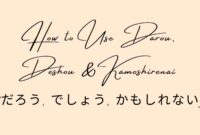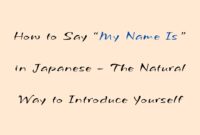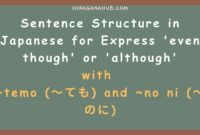Japanese Grammar: Expressing Various Activities with ~tari suru
(~たりする)
Today, we will learn how to describe multiple actions or conditions in
Japanese using the ~tari suru (~たりする) pattern.
This pattern allows us to mention several activities or states in a
non-sequential manner within a single sentence. Let’s dive in!

How to Use ~tari suru (~たりする)
To use this pattern, conjugate verbs, adjectives, or nouns into their past
tense and add “ri (り)” at the end.
You can list one or more verbs in this form, then conclude the sentence with
“suru (する)”, which can be conjugated as needed.
Examples:
昨日、私は本を読んだり、カフェに行ったり、映画を観たりしました。
(きのう、わたしは ほんを よんだり、かふぇに いったり、えいがを みたり
しました。)
(Kinou, watashi wa hon o yondari, kafe ni ittari, eiga o mitari
shimashita.)
→ Yesterday, I read a book, went to a café, watched a movie, and etc.
In this example, past-tense verbs like
読んだ (yonda – read), 行った (itta – went), 観た (mita – watched)
are followed by “ri (り)” and end with
“shita (しました),” the past tense of
suru (する).
Not Just for Verbs—Adjectives and Nouns Work Too!
This pattern can also be used with adjectives and nouns by
following the same rules.
For adjectives, convert them into their past tense, add
“ri (り),” and finish with suru (する).
Example:
この町の天気は寒かったり、暑かったりする。
(このまちの てんきは さむかったり、あつかったり する。)
(Kono machi no tenki wa samukattari, atsukattari suru.)
→
The weather in this town is sometimes cold, sometimes hot, and so on.
With this pattern, we can describe
varied situations or alternating conditions.
More Example Sentences Using ~tari suru
-
来月、私は旅行したり、新しいレストランで食事したりする予定です。
(らいげつ、わたしは りょこうしたり、あたらしい れすとらんで
しょくじしたり する よていです。)
(Raigetsu, watashi wa ryokou shitari, atarashii resutoran de shokuji
shitari suru yotei desu.)
→ Next month, I plan to travel, eat at a new restaurant, and etc. -
この映画は面白かったり、悲しかったりするね。
(このえいがは おもしろかったり、かなしかったり するね。)
(Kono eiga wa omoshiro kattari, kanashikattari suru ne.)
→ This movie is sometimes fascinating, sometimes sad. -
週末、私は友達とカラオケに行ったり、公園で散歩したりしたい。
(しゅうまつ、わたしは ともだちと からおけに いったり、こうえんで
さんぽしたり したい。)
(Shuumatsu, watashi wa tomodachi to karaoke ni ittari, kouen de sanpo
shitari shitai.)
→ This weekend, I want to go to karaoke with friends, walk in the
park, and etc. -
パリに行けたら、美術館を見たり、カフェでコーヒーを飲んだりしたいです。
(ぱりに いけたら、びじゅつかんを みたり、かふぇで こーひーを のんだり
したいです。)
(Pari ni iketara, bijutsukan o mitari, kafe de koohii o nondari shitai
desu.)
→ If I can go to Paris, I want to visit art museums, drink coffee
at a café, and etc.
Vocabulary List from Example Sentences
| Kanji | Hiragana | Romaji | Meaning |
|---|---|---|---|
| 昨日 | きのう | kinou | yesterday |
| 本 | ほん | hon | book |
| 読む | よむ | yomu | to read |
| カフェ | かふぇ | kafe | café |
| 行く | いく | iku | to go |
| 映画 | えいが | eiga | movie |
| 観る | みる | miru | to watch |
| 町 | まち | machi | town/city |
| 天気 | てんき | tenki | weather |
| 寒い | さむい | samui | cold (weather) |
| 暑い | あつい | atsui | hot (weather) |
| 旅行する | りょこうする | ryokou suru | to travel |
| 予定 | よてい | yotei | plan/schedule |
| 面白い | おもしろい | omoshiroi | interesting |
| 悲しい | かなしい | kanashii | sad |
| 友達 | ともだち | tomodachi | friend |
| 歩く | あるく | aruku | to walk |
| 美術館 | びじゅつかん | bijutsukan | art museum |
| 飲む | のむ | nomu | to drink |
Summary
✔ ~tari suru (~たりする) is used to list multiple actions or
conditions in a non-sequential manner.
✔ Verbs,
adjectives, and nouns can all be used with this pattern once converted to
their past form.
✔ This structure helps express random activities or alternating conditions.
I hope this explanation helps! Enjoy your studies, and catch you in the next
lesson!


